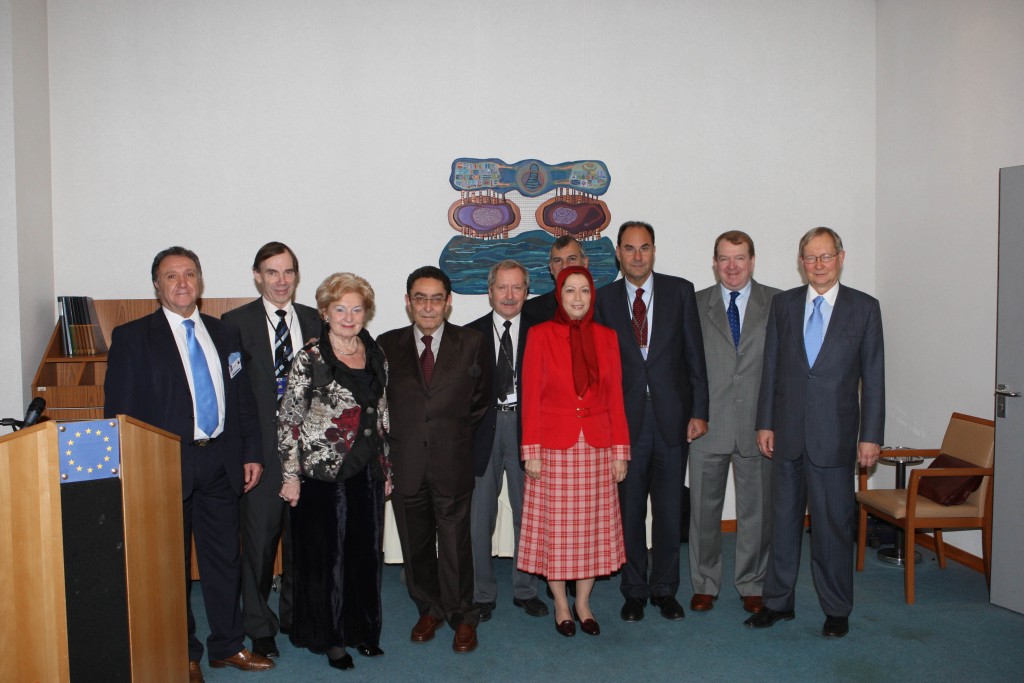“The popular support of the Resistance empowers it to bring about change in Iran”

Addressing a meeting on Wednesday at the European Parliament on the invitation of the EP’s Vice-President Mr. Alejo Vidal Quadras, Mrs. Rajavi said, “The PMOI, as the pivotal force of the Resistance, advocates a democratic and tolerant Islam. It is therefore the political and cultural antidote to the mullahs’ regime.
For the same reason, the PMOI is also very popular among Iraqi people. In June 2006, 5.2 million Iraqis signed a declaration in support of the PMOI.”
It is indeed a privilege to have the opportunity to be with you today. I thank Dr. Alejo Vidal Quadras for this meeting,
I also thank him and more than 700 European Parliamentarians for their joint declaration expressing concern over the growing violations of human rights in Iran.
Yesterday, the United Nations General Assembly adopted a resolution condemning “systematic violations of human rights and fundamental freedoms”, “public executions”, “stoning”, “execution of persons who were under the age of Eighteen”, “torture and inhuman punishment”, “violent repression and sentencing of women exercising their right to peaceful assembly” and. “discrimination against religious and ethnic minorities”.
The mullahs’ regime is also exporting terrorism and fundamentalism to other countries.
I think all of us would agree that the issue of Iran is the most serious crisis the world is facing.
And we all would also agree that the real question to answer is how to resolve this problem.
We believe the answer is the third option: No to appeasement, no to foreign military intervention, but democratic change by the people of Iran and their Resistance. This however, leads to another question: Does the Iranian Resistance have enough popular support to bring about such a change?
I would like to address this issue briefly and would be delighted to hear your views. Of course, measuring the tendencies of citizens under a religious dictatorship is different from that of a free society in which people could go to the polls freely or take part in a survey.
Neither the PMOI nor NCRI claim to have the support of 70 or 80 percent of the Iranian people. That would be naïve. It is impossible to make a statistical assessment under absolute repression of the diverse political tendencies of Iranian society. However, there are other indications in such a situation. I would like to briefly refer to five such indicators.
First, about the Resistance network in Iran: It plays a vital role in organizing protests by students, teachers and workers. Anti-government demonstrations over the past three months clearly demonstrate the effectiveness of this network.
These networks help finance the movement. Exposing the mullahs’ secret nuclear activities and documentary evidence on human rights violations are provided by the same networks. Having access to information on the regime’s terror network is another sign of this Resistance’s popular base.
The second indicator is the Iranian regimes’ constant demand from its Western partners to restrict our activities. After visiting Iran, Chairman of the Foreign Affairs Committee of the British Parliament said on 28 November: “We were struck by the number of times that the Iranians wanted to raise the issue of the PMOI to a level of obsession.”
According to the state controlled media in Iran, the PMOI was the main topic of discussion when the European Parliament delegation visited Iran last week. Rather than meeting with the victims of the regime, the delegation met with different associations affiliated with Iran’s Ministry of Intelligence. Of course, these associations were suppose to be NGO’s. The mullahs’ objective was to convey this message through the EP delegation that lack of concessions by the West caused greater human rights abuses in Iran. Sadly, the EP delegation conveyed exactly the same message. This is whitewashing mullahs’ crimes.
If the PMOI is not popular in Iran, why should the regime pay so much attention to it?
The third indicator is the movement’s’ support among Iranians outside Iran. Tens of thousands of people participate in different gatherings in support of the Resistance in the US or in European capitals.
Last June, Dr. Vidal Quadras took part in one such gathering in Paris. I may add that these Iranians essentially represent Iran’s middle class.
The fourth indicator is the movement’s’ background. Before the start of the mass executions and the reign of terror, the PMOI’s official publication had a circulation of six hundred thousand. PMOI meetings attracted several hundred thousand.
Since 1981, the mullahs have executed 120,000 political opponents. But, they have failed to destroy the Resistance. Despite the difficult conditions in Ashraf City, many young people are joining the PMOI in Ashraf.
The fifth indicator is the cultural identity of the Resistance. The PMOI, as the pivotal force of the Resistance, advocates a democratic and tolerant Islam. It is therefore the political and cultural antidote to the mullahs’ regime.
For the same reason, the PMOI is very popular among Iraqi people. In June 2006, 5.2 million Iraqis signed a declaration in support of the PMOI.
Recently, in another show of support, 300,000 Shiites in southern Iraq signed a similar statement.
The popular support of the Resistance coupled by its unity and organizational ability empowers it to bring about change in Iran.
I very much look forward to hearing your views and questions.
- Tags: Iran, Maryam Rajavi, MEK, NCRI

